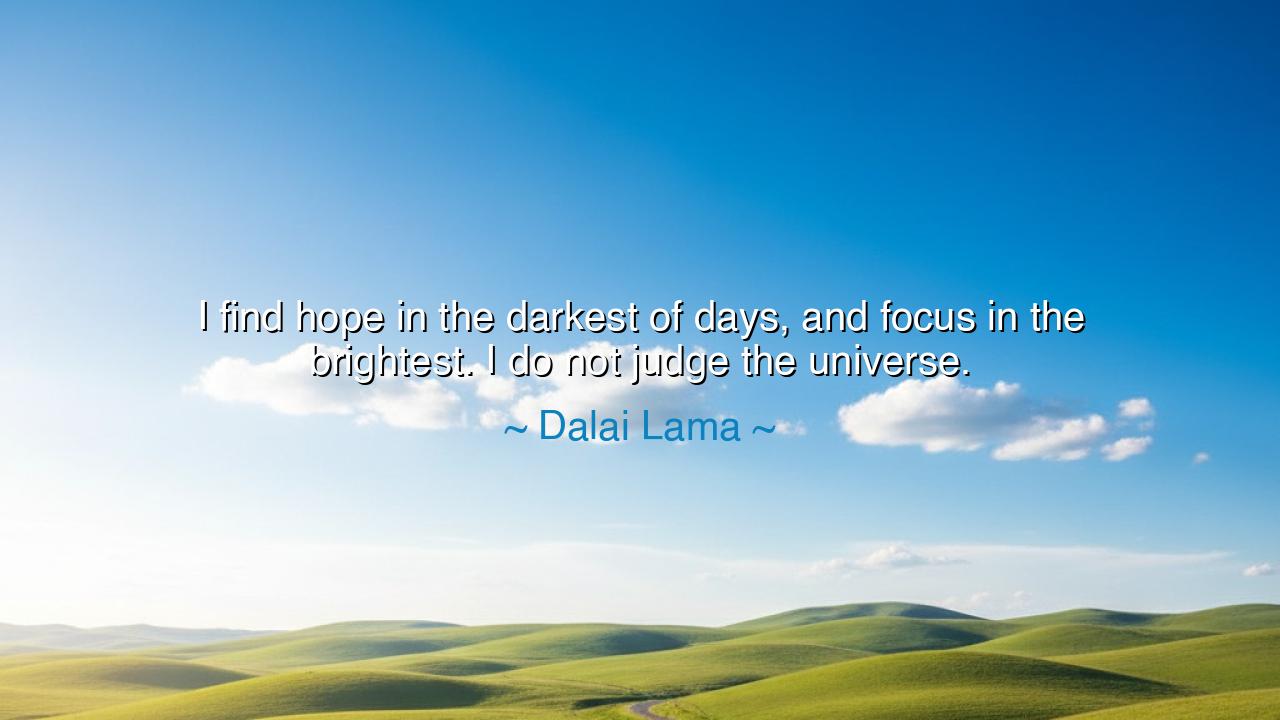
I find hope in the darkest of days, and focus in the brightest. I
I find hope in the darkest of days, and focus in the brightest. I do not judge the universe.






The words of the Dalai Lama — “I find hope in the darkest of days, and focus in the brightest. I do not judge the universe.” — resound with the calm strength of a soul that has seen both suffering and serenity, exile and enlightenment. In these few lines, he distills the wisdom of centuries — the essence of spiritual balance, the art of finding harmony within chaos and humility within understanding. His teaching is not merely philosophical, but profoundly human: to live well is to hold hope when the night seems endless, and to remain focused when the light grows blinding. And above all, to trust that the universe, in all its vastness and mystery, moves according to a rhythm beyond the judgment of man.
To understand this saying, one must know the life from which it was born. The Dalai Lama was but a child when he was enthroned as Tibet’s spiritual leader, and still young when his nation was seized and his people scattered. In exile, he witnessed the darkest of days — the loss of home, the anguish of his followers, the crushing of his country’s freedom. Yet he did not turn to despair. Instead, he became a voice of peace, compassion, and endurance. In his darkness, he found hope — not in revenge or resistance, but in faith that love and wisdom could still illuminate the path ahead. Such hope is not naive optimism, but the highest courage — the fire that continues to burn when all other lights have gone out.
When he speaks of finding focus in the brightest days, he reminds us that joy and success, too, are trials of the spirit. Many can endure hardship, but few can remain humble in fortune. When life shines upon us, the mind is easily lulled into distraction, indulgence, or pride. The Dalai Lama teaches that in times of prosperity, one must cultivate clarity — the discipline to remain centered, grateful, and mindful of impermanence. Just as the lotus rises pure from the mud, so must the soul remain rooted in awareness, even amid abundance. For the wise know that the brightest days are fleeting, and that focus is the guardian of peace.
The final and most profound line — “I do not judge the universe” — is the heart of this teaching. It is a declaration of acceptance, born of deep spiritual understanding. To judge the universe is to rebel against the very order of existence — to demand that life unfold according to our desires, to curse the storm because we wished for calm. The Dalai Lama, like the ancient Stoics before him, understood that the universe moves by laws beyond our grasp. The task of the wise is not to judge, but to align with its flow — to see that every joy and sorrow has its place, and that even suffering can become the soil from which compassion grows.
History has shown this truth again and again. Consider the life of Nelson Mandela, who spent twenty-seven years imprisoned, his youth consumed by darkness. He could have judged the universe as cruel, could have cursed fate for his suffering. Instead, he found hope in his cell, and focus in his mission. When he emerged, he did not seek vengeance but reconciliation. Like the Dalai Lama, he understood that the meaning of life is not found in controlling the universe, but in mastering oneself within it. Hope in despair, focus in triumph, and humility before the mystery of existence — these are the marks of the truly enlightened.
The ancients, too, would have recognized this teaching. The Stoic sage Epictetus, once a slave, taught that man cannot control what happens to him — only how he responds. The Buddhist monk, the philosopher of Rome, the mystic of India — all would agree that peace comes when one ceases to wage war against the flow of life. To “not judge the universe” is to see that it is neither cruel nor kind, but whole — and that within its wholeness lies the purpose of every moment.
So let this be the teaching for those who walk the path of uncertainty: when darkness comes, seek the small flame of hope — it may be faint, but it is real. When light shines, guard your focus, lest you lose yourself in comfort. And above all, release the need to judge the universe — for it is vaster than your understanding, wiser than your desire, and more merciful than your fear. Live instead with trust, with patience, and with wonder. For in the quiet acceptance of life as it is, you will find what the Dalai Lama found: not a perfect world, but a perfect peace.






AAdministratorAdministrator
Welcome, honored guests. Please leave a comment, we will respond soon